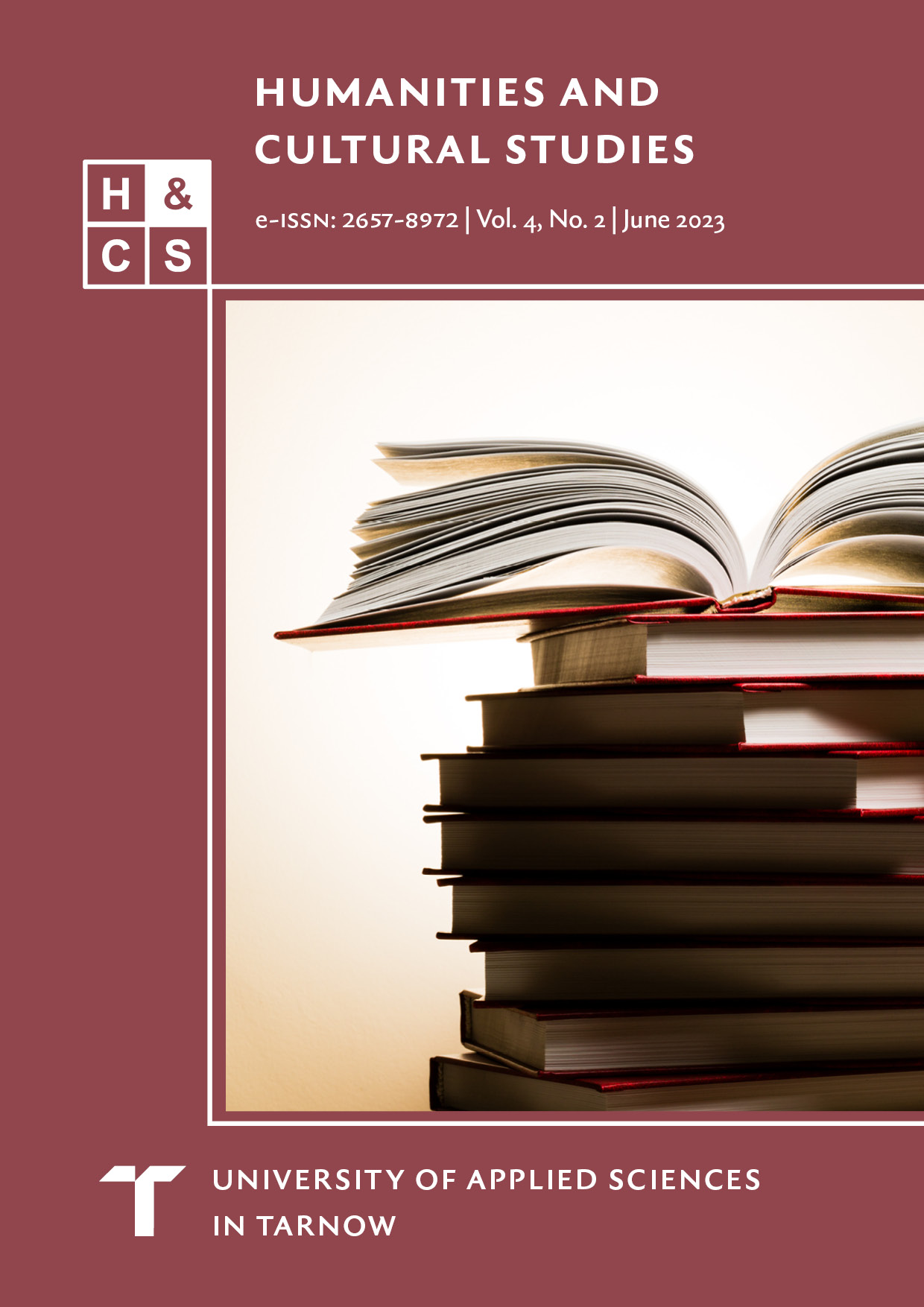The exclusivity of artistic experience
DOI:
https://doi.org/10.55225/hcs.540Keywords:
exclusivism, experience, Dionysian, artistry, statelyAbstract
If art were open to the public, it would cause irreparable damage - to paraphrase one of the most important philologists of the modern era, Friedrich Nietzsche. The thoroughly experimental nature of art, which oscillates around uncertainty and aimlessness, effectively prevents it from being accessible to everyone. The popularization of the work of art remains a socially harmful assumption, as it leads to the self-destruction of ‘mediocre nature’. The exclusivism of the artistic experience vouches for the identity of brave personalities ready for numerous sacrifices and dangers. The boundary between madness and a state of inspiration is very thin. Crossing it requires extraordinary sensitivity and subtlety. In his work ‘On Love’, Stendhal, in the spirit of aristocratic chauvinism, states: “despite my many efforts, I cannot give ears to the deaf and eyes to the blind”. Thus, the psychagogy of artistry is a paradoxical endeavour and the result of misunderstandings arising from the pushing of an educational model founded on absolutist egalitarianism. At the same time, the artistic experience excludes no one and nothing - for it is a kind of the most exquisite apologia of Life. In the creative act, a particular kind of activity, thoroughly sporadic and rare, readiness for the New takes centre stage. Unpredictability, which frightens most, is the highest kind of inspiration for the creator. For something to come into being par excellence, it cannot pre-exist, even in a supernatural reality. Nor can it be pre-conceived if it is to be unique. And this already escapes all rules. Man believes in truth, the artist in the World — the abode of the mysterious.
Downloads
References
Barthes R., Mitologie, tłum. A. Dziadek, Warszawa 2008. Google Scholar
Barthes R., Przyjemność tekstu, tłum. A. Lewańska, Warszawa 1997. Google Scholar
Bataille G., Doświadczenie wewnętrzne, tłum. O. Hedemann, Warszawa 1998. Google Scholar
Bataille G., Literatura a zło, tłum. M. Wodzyńska-Walicka, Kraków 1992. Google Scholar
Benisz H., Estetyka Nietzschego jako nowa filozofia człowieka, „Przegląd Filozoficzny” 1998, r. 7, nr 4 (28), https://pf.uw.edu.pl/images/NUMERY_PDF/028/PF_1998-R7_4_03_Benisz-H_Estetyka.pdf [dostęp: 10 maja 2023 r.]. Google Scholar
Brzozowski S., Kultura i życie. Zagadnienia sztuki i twórczości w walce o światopogląd, Wydawnictwo Instytutu Literackiego, Warszawa 1936. Google Scholar
Carlyle T., Bohaterowie, tłum. T. Macios, Kraków 2006. Google Scholar
Chmielowski F., Sztuka i doświadczenie, „Estetyka i Krytyka” 2005–2006, nr 9/10, s. 63–75, https://pjaesthetics.uj.edu.pl/documents/138618288/139072857/eik_9-10_5.pdf/2c71b0e0-1c13-435e-8618-72cccc9508e1 [dostęp: 22 marca 2023 r.]. Google Scholar
Chodkowski R., Widownia antycznego teatru greckiego, „Roczniki Humanistyczne” 2001, t. 49, z. 3, s. 61–93, https://bibliotekanauki.pl/articles/1954797.pdf, [dostęp: 23 maja 2023 r.]. Google Scholar
Dankowska J., Miejsce muzyki w filozofii Fryderyka Nietzschego, „Estetyka i Krytyka” Google Scholar
, t. 1, nr 1, s. 24, https://pjaesthetics.uj.edu.pl/documents/138618288/ Google Scholar
/EiK01_02_Dankowska.pdf/7d9b86be-58fe-44d9-961e-f257723db2a8 [dostęp: 20.04. 2023]. Google Scholar
Deleuze G., Nietzsche, tłum. B. Banasiak, Warszawa 2000. Google Scholar
Domeracki P., Elzenbergowski arystokratyzm ducha, [w:] Elzenberg — tradycja i współczesność, red. W. Tyburski, R. Wiśniewski, Toruń 2009, https://repozytorium.umk.pl/bitstream/handle/item/1120/DOMERACKI%20Piotr%20-%20Elzenbergowski%20arystokratyzm%20ducha.pdf?sequence=1, [dostęp: 15 kwietnia 2023 r.]. Google Scholar
Gombrowicz W., Dzienniki 1953–1969, Kraków 2007. Google Scholar
Górska I., Doświadczenie jako próba dzieła — próba siebie, „Pamiętnik Literacki” 2012, nr 2, s. 115–139, http://rcin.org.pl/Content/63752/PDF/WA248_81711_P-I-30_gorska-doswiadczenie_o.pdf [dostęp: 22 marca 2023 r.]. DOI: https://doi.org/10.18318/pl.2012.2.6 Google Scholar
Harrison J.E., Religion of Ancient Greece, Londyn 1913. Google Scholar
Jaspers K., Rozum i egzystencja. Nietzsche a chrześcijaństwo, Warszawa 1991. Google Scholar
Klossowski P., Nietzsche i błędne koło, tłum. B. Banasiak i K. Matuszewski, Warszawa 1996. Google Scholar
Kłosiewicz O., Literatura jako doświadczenie magiczne w ujęciu estetyki i antropologii kultury, Warszawa 2013, https://depotuw.ceon.pl/bitstream/handle/item/344/doktorat.olga_k%C5%82osiewicz.pdf?sequence=1 [dostęp: 9 maja 2023 r.]. Google Scholar
Kumaniecki K., Historia kultury starożytnej Grecji i Rzymu, Warszawa 1964. Google Scholar
Lautréamont C., Pieśni Maldorora i Poezje, tłum. M. Żurowski, Warszawa 1976. Google Scholar
Lichtenberg G.C., Philosophical Writings, Albany 2012. Google Scholar
Machiavelli N., Il principe, rozdz. XXV, 1814. Google Scholar
Michels S., Nietzsche and the Religion of the Future, „Animus: A Philosophical Journal for Our Time” 2004, nr 9, s. 52–72, https://digitalcommons.sacredheart.edu/cgi/viewcontent.cgi?article=1017&context=gov_fac [dostęp: 7 września 2022 r.]. Google Scholar
Mikołejko Z., Mity tradycjonalizmu integralnego. Julius Evola i kultura religijno-filozoficzna prawicy, Warszawa 1998, https://bibliotekanauki.pl/books/1365644.pdf [dostęp: 26 maja 2023 r.]. Google Scholar
Nietzsche F., Nachlaß 1884–1885, tłum. G. Kowal, Warszawa 2011. Google Scholar
Nietzsche F., Pisma pozostałe, tłum. B. Baran, Kraków 2004. Google Scholar
Nietzsche F., Wędrowiec i jego cień, tłum. R. Mitoraj, Kraków 2005. Google Scholar
Nietzsche F., Wiedza radosna, tłum. M. Łukasiewicz, A. Kopacki, L. Staff, Gdańsk 2008. Google Scholar
Nietzsche F., Wola mocy, tłum. K. Drzewiecki, S. Frycz, Kraków 2011. Google Scholar
Pieniążek P., Suwerenność a nowoczesność. Z dziejów poststrukturalistycznej recepcji myśli Nietzschego, Łódź 2006. Google Scholar
Prusik W., Sztuka i mistyka: ekspresja jako artystyczne doświadczenie absolutu, „Analiza i Egzystencja” 2013, nr 21, s. 131–147, https://bazhum.muzhp.pl/media/files/Analiza_i_Egzystencja/Analiza_i_Egzystencja-r2013-t21/Analiza_i_Egzystencja-r2013-t21-s131-147/Analiza_i_Egzystencja-r2013-t21-s131-147.pdf [dostęp: 22 maja 2023 r.]. Google Scholar
Rochefoucauld F. de La, Maksymy i rozważania moralne, tłum. T. Boy-Żeleński, Kraków 2004. Google Scholar
Różewicz T., Poezja, dramat, proza, Wrocław 1973. Google Scholar
Sandauer A., Liryka i logika. Wybór pism krytycznych, Warszawa 1969. Google Scholar
Stendhal, Czerwone i czarne, tłum. T. Boy-Żeleński, wolnelektury.pl, http://wolnelektury.pl/katalog/lektura/stendhal-czerwone-i-czarne [dostęp: 30 maja 2023 r.]. Google Scholar
Stendhal, O miłości, tłum. T. Boy-Żeleński, wolnelektury.pl, https://wolnelektury.pl/katalog/lektura/stendhal-o-milosci.html [dostęp: 30 maja 2023 r.]. Google Scholar
Stendhal, Pustynia parmeńska, tłum. T. Boy-Żeleński, Warszawa 2018. Google Scholar
Tukidydes, Wojna peloponeska, tłum. K. Kumaniecki, Warszawa 1953. Google Scholar
Downloads
Published
How to Cite
Issue
Section
License
Copyright (c) 2023 michał_borkowski

This work is licensed under a Creative Commons Attribution-NonCommercial 4.0 International License.





